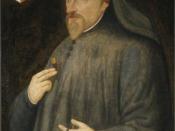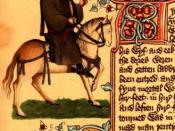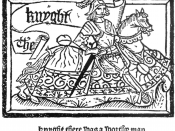Portrait of medieval society in "General Prologue" of Geoffrey Chaucer's "The Canterbury Tales"
On the 21. September 1066 the history of England changed forever. On that day William, who will be later know as "the Conqueror", set his foot on the coast of Britain. The campaign was short and effective. Great victory at Hastings enabled William to quickly take control over the country and coronate himself in Westminster. With new king, the society, customs and culture started to change, to fit to French ideals. Among the other things, but probably most important one, was introduction of estates society.
Let's now jump in time to year 1387. Retired Clerk of Works Geoffrey Chaucer finishes prologue of his masterpiece "The Canterbury Tales". Chaucer was born around 1340 and lived through a time of incredible tension in the English social sphere. The Black Death, which ravaged England during Chaucer's childhood and remained widespread afterward, wiped out an estimated thirty to fifty percent of the population.
Consequently, the labour force gained increased leverage and was able to bargain for better wages, which led to resentment from the nobles and propertied classes. These classes received another blow in 1381, when the peasantry, helped by the artisan class, revolted against them. The merchants were also wielding increasing power over the legal establishment, as the Hundred Years War created profit for England and, consequently, appetite for luxury was growing. The merchants capitalized on the demand for luxury goods, and when Chaucer was growing up, London was pretty much run by a merchant oligarchy, which attempted to control both the aristocracy and the lesser artisan classes. This observations and knowledge of literature gained during the travels around Europe allowed Chaucer to create the greatest portrait of medieval society in history. That was achieved in "The Canterbury...


